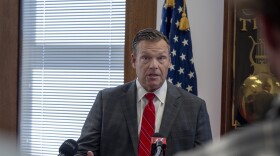Phyllis McCosh was born in 1920, just after the last major pandemic. A century later, she died as a victim of the current pandemic.
McCosh taught piano for the greater part of that century and elementary school music for a third of it. She was born on a farm and spent most of her life on another one, just north of Abilene, Kansas.
“She helped dad with the farm. She raised six kids,” recalls Cathy Matlack, one of three daughters who shared a bedroom and a bed in the family farmhouse. “I never ever remember hearing her complain about her burden, her responsibilities that she did every day with great care and great love.”
McCosh spread that love to her students as well as her family.
A stack of cards and letters sent to McCosh for her 100th birthday in September included several from former pupils, who went on to their own careers in music education. One of her disciples is her granddaughter Amy Diediker, Cathy Matlack’s daughter.
“I'm a music teacher myself. Grandma and I had many conversations about the best way to get children to enjoy music. And so much of it for grandma was about making children feel safe,” recalls Diediker. “She just had a way of making you feel loved the minute you came in the room.”
McCosh didn’t move off the farm until she was in her late 80s after her husband died. Matlack and her sister set McCosh up in a nursing home in Lenexa, Kansas, so that the family could take care of her, and so that McCosh could take care of the family — especially the children.
“It was so clear for [us] the kids to know and to see and to feel the joy that she would have when they would interact with her,” says Matlack, recalling frequent family visits. “It was such an exchange of joy for both of them.”
But the joy ended abruptly March 11, when Matlack got a call from the nursing home. Her mom was fine, but with the pandemic raging, the home could no longer allow visitors.
Seven and a half agonizing months followed.
“Every day, I wondered what she was thinking and if she knew why I wasn't there or if she understood,” says Matlack.
FaceTime and Zoom calls only seemed to confuse McCosh. She couldn’t make out what people were saying or where they were. Matlack’s talks with nursing home staff were disheartening.
“She'd become very withdrawn. Which, why wouldn't you? She didn't understand why people were behaving this way and why your family had disappeared.”
Then, this October, another call came. McCosh had tested positive for the coronavirus. A week later, she was clearly dying.
At least now, close family could visit, but those visits required a protective gown, face shield and two masks.
“The tough part was, we're not sure mom recognized us. All she could see possibly were our eyes,” recalls Matlack tearfully. Regaining her composure, she adds, “I put my hands on each side of her face and put my eyes right on top of hers, and then told her we were there, which was great. It felt really good.”
Phyllis McCosh died on October 24 and left behind nearly 70 family members, as well as a growing musical legacy that includes Diediker’s three children, all skilled musicians indebted to McCosh.
“She loved to hear us play, and she was also very good at piano herself,” says 14-year-old Owen Diediker, Amy’s oldest, just before sitting down at the family's grand piano and knocking out a powerful rendition of the jazz standard “Misty.”
"Her playing was beautiful," he says, "and I always wanted to play like that.”
Copyright 2020 KCUR 89.3








